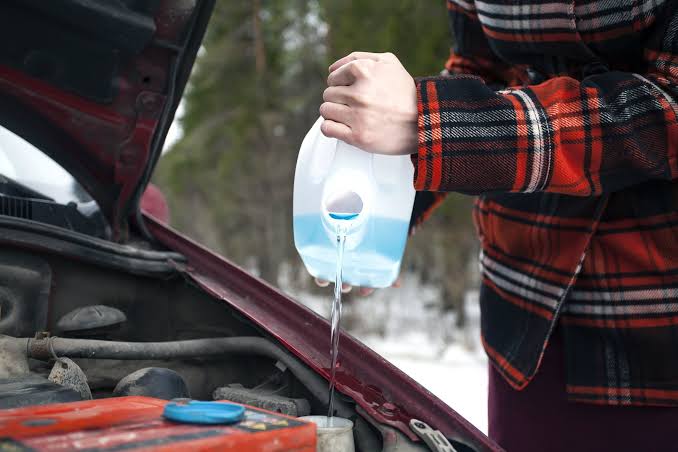As the temperatures drop, drivers in colder climates often face the annoying and potentially dangerous problem of frozen washer fluid. This issue can leave you unable to clear your windshield, severely impairing visibility and compromising safety on the road. In this blog, we’ll explore the causes of frozen washer fluid, preventative measures, and solutions to get you through the winter months safely.
Understanding Frozen Washer Fluid
Frozen washer fluid occurs when the fluid in your windshield washer system freezes, rendering it unusable. This can happen if the fluid is not rated for low temperatures, or if it gets diluted with water. In cold weather, even washer fluid rated for freezing temperatures can struggle if the temperatures drop significantly lower than the fluid’s rated protection.
Causes of Frozen Washer Fluid
- Improper Washer Fluid: Not all washer fluids are designed for cold weather. Some are formulated for summer use and lack the necessary antifreeze components.
- Dilution: Adding water to your washer fluid can lower its freezing point. Even washer fluid rated for cold weather can freeze if it’s diluted with too much water.
- Extreme Cold: In regions with extremely low temperatures, even washer fluid rated for freezing conditions can occasionally freeze.
Preventative Measures
Preventing washer fluid from freezing starts with choosing the right products and taking some simple precautions:
- Use Winter-Grade Washer Fluid: Ensure you use washer fluid specifically designed for winter conditions. Look for fluids rated to withstand temperatures well below freezing, often labeled with a temperature rating on the container.
- Avoid Diluting the Fluid: Do not mix washer fluid with water, as this lowers the freezing point and makes it more likely to freeze.
- Check and Replace Fluid Regularly: Before winter sets in, check your washer fluid reservoir and replace any summer-grade fluid with winter-grade fluid. Even if the fluid looks fine, replacing it can ensure you have the right mixture for cold weather.
- Keep Your Vehicle Warm: Whenever possible, park your vehicle in a garage or sheltered area to help protect it from extreme cold.
Dealing with Frozen Washer Fluid
If your washer fluid does freeze, there are several steps you can take to address the problem:
- Thaw the Fluid: Move your vehicle to a warmer location, such as a heated garage. If that’s not possible, use a portable heater or hairdryer to gently warm the washer fluid reservoir and lines. Be careful not to overheat or cause damage.
- Add Isopropyl Alcohol: Adding a small amount of isopropyl alcohol (rubbing alcohol) to the washer fluid reservoir can help lower the freezing point and thaw the fluid. Isopropyl alcohol is a common ingredient in commercial de-icing solutions.
- Replace the Fluid: Once the fluid has thawed, drain the washer reservoir and replace it with winter-grade washer fluid. This will prevent the problem from recurring.
Emergency Solutions
In a pinch, there are a few emergency solutions that can help you deal with frozen washer fluid on the road:
- Use a De-Icer Spray: Carry a commercial windshield de-icer spray in your vehicle. These sprays can quickly melt ice on your windshield and provide a temporary solution until you can address the washer fluid issue.
- Manual Cleaning: If your washer fluid is frozen and you can’t clear your windshield, pull over safely and manually clean your windshield with an ice scraper and de-icer spray. While not ideal, this can help you maintain visibility until you can resolve the problem.
Maintaining Your Washer System
Regular maintenance of your windshield washer system can help prevent freezing and ensure it functions properly:
- Check the Nozzles: Make sure the washer nozzles are not clogged with ice or debris. Clean them regularly to ensure proper spray patterns.
- Inspect Hoses and Reservoir: Look for cracks or leaks in the washer fluid reservoir and hoses. Even small leaks can allow water to enter and dilute the fluid, increasing the risk of freezing.
- Test Regularly: Periodically test your washer fluid system, especially before long trips or during sudden drops in temperature. Ensuring it’s working properly can prevent surprises on the road.
Conclusion
Frozen washer fluid is more than just an inconvenience—it can be a significant safety hazard. By using the right winter-grade washer fluid, avoiding dilution, and taking preventative measures, you can keep your windshield clear and your driving safe all winter long. If your washer fluid does freeze, thaw it safely and replace it with the appropriate fluid to avoid recurring issues. Regular maintenance and preparedness can make a world of difference, ensuring that you have a clear view of the road, no matter how cold it gets.




Post Comment